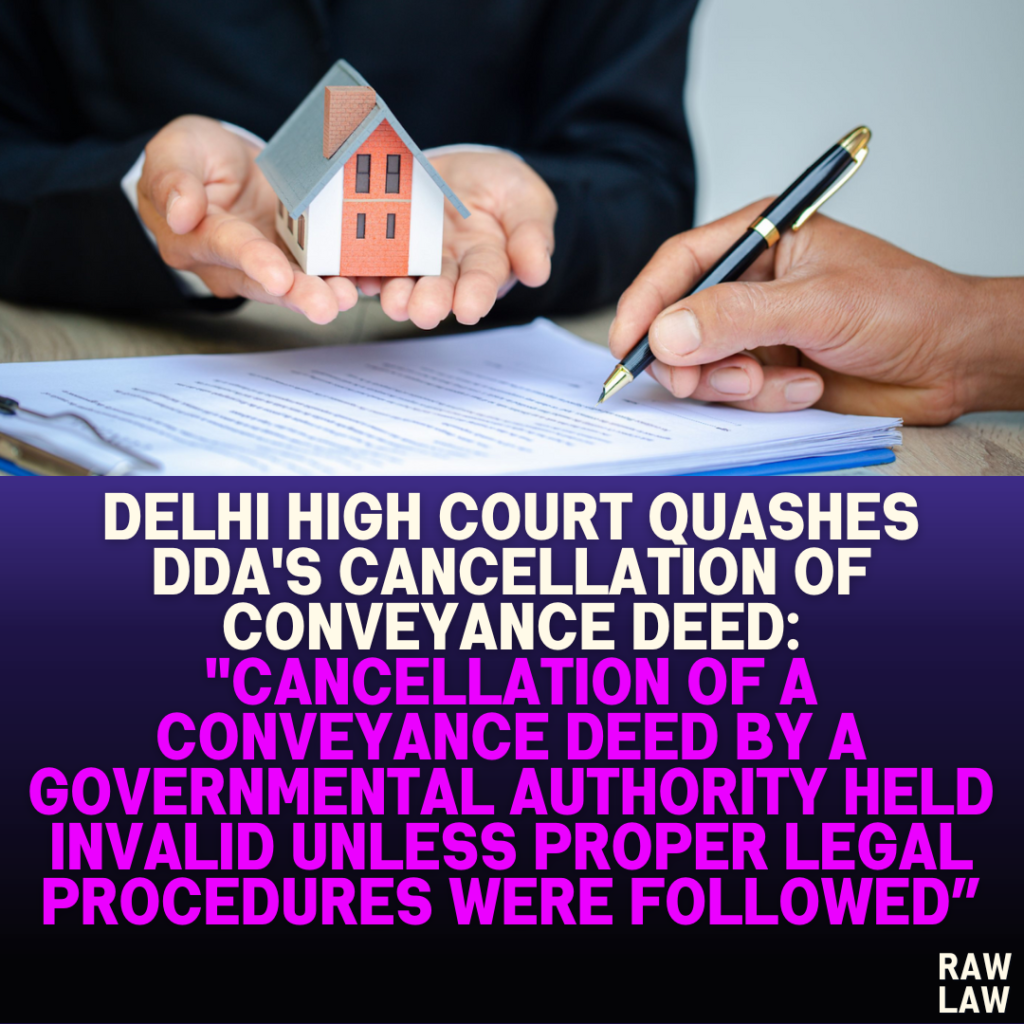Court’s Decision:
The Delhi High Court quashed the DDA’s cancellation of the Conveyance Deed dated 13.04.2004, which was executed in favor of the petitioner. The court found that the DDA had no legal basis to unilaterally cancel the Conveyance Deed and upheld the petitioner’s bona fide ownership of the property. The court further held that the petitioner was not given a fair opportunity to present her case in prior proceedings that led to the cancellation of the allotment under Rule 25 of the Delhi Cooperative Societies Rules, 1973.
Facts:
The petitioner had purchased a flat from the original allottee, who was a member of a cooperative society. Following the purchase, the petitioner applied for and received a Conveyance Deed converting the flat from leasehold to freehold. However, the DDA later issued a show cause notice (SCN), alleging that the original allottee had violated Rule 25 by owning two properties. The DDA subsequently canceled the Conveyance Deed on this ground, asserting that the original allottee’s membership in the cooperative society had been canceled due to her ineligibility to own more than one property. The petitioner was not a party to the previous legal proceedings that had questioned the allotment of the flat, nor was she given notice before the DDA canceled the Conveyance Deed.
Issues:
Whether the DDA was justified in canceling the Conveyance Deed based on the original allottee’s violation of Rule 25 of the Delhi Cooperative Societies Rules, 1973.
Whether the petitioner, as a bona fide purchaser, had any protection against the cancellation of the Conveyance Deed.
Petitioner’s Arguments:
The petitioner contended that she was a bona fide purchaser for valuable consideration and that there was no fraud, misrepresentation, or suppression of facts on her part during the transaction.
The petitioner also argued that she had acquired the flat in compliance with the applicable rules and had obtained a No Objection Certificate (NOC) from the society for the transfer.
The cancellation of the Conveyance Deed was illegal and violated the principles of natural justice as she was not provided an opportunity to be heard.
Furthermore, the petitioner claimed that even if the DDA had the authority to revoke the Conveyance Deed, it was bound to follow due process, which it failed to do.
Respondent’s Arguments:
The DDA argued that the original allottee had violated Rule 25 of the Delhi Cooperative Societies Rules, 1973, by holding two properties, which made her ineligible for allotment of the flat. As a result, the Conveyance Deed issued to the petitioner was void ab initio.
The DDA maintained that the petitioner was not entitled to protection as she had acquired the flat from someone who was not legally entitled to own it under the cooperative society rules.
Analysis of the Law:
The court examined the provisions of Rule 25 of the Delhi Cooperative Societies Rules, 1973, which disqualified individuals from owning more than one property in a housing society. It also considered the legal principles surrounding the cancellation of a registered conveyance deed, holding that such deeds cannot be unilaterally canceled without due process.
Precedent Analysis:
The court referred to earlier decisions where the unilateral cancellation of a conveyance deed by a governmental authority had been held invalid unless proper legal procedures were followed. The court cited the case of Sunil Kumar Dey v. DDA, where a similar situation arose, and it was held that the sale consideration must be recovered from the original allottee, not the subsequent purchaser, if the latter was a bona fide purchaser.
Court’s Reasoning:
The court emphasized that the petitioner had purchased the flat in good faith and had no involvement in any alleged wrongdoing by the original allottee. It also held that the DDA acted in violation of the principles of natural justice by canceling the Conveyance Deed without giving the petitioner a fair opportunity to defend her case. The court further noted that the DDA’s reliance on Rule 25 did not justify the cancellation as it failed to follow proper legal channels, including filing a suit under Section 31 of the Specific Relief Act.
Conclusion:
The court allowed the writ petition and quashed the DDA’s cancellation of the Conveyance Deed. It declared that the Conveyance Deed executed in favor of the petitioner remains valid for all legal purposes. However, the DDA was granted liberty to proceed against the original allottee in accordance with the law.
Implications:
This judgment underscores the protection available to bona fide purchasers in property transactions involving cooperative societies and government allotments. It also reinforces the legal principle that governmental authorities must follow due process and cannot unilaterally cancel registered conveyance deeds without affording affected parties an opportunity to be heard.




Pingback: Orissa High Court Acquits Appellants in Alleged Murder Case, Cites Delays, Inconsistent Testimonies, and Lack of Forensic Evidence; Weapon Recovery Inadmissible Under Section 27 of Evidence Act as Found in Public Place - Raw Law
Pingback: Patna High Court Sets Aside Conviction of Two Accused Due to Lack of Evidence, Upholds Life Imprisonment for Main Accused in Murder Case - Raw Law